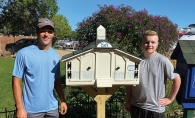
As a young boxer in Oklahoma, Willie Carter knew that if he wanted to make his mark in the boxing world, he needed to align himself with the best. Or in this case, the greatest.
“I told some guys [I was boxing with] that I couldn’t make it in Oklahoma. I decided I was going to meet Muhammad Ali,” says Carter, who now lives in Saint Paul. He did exactly that, first meeting Ali at a parade in Oklahoma City in the late 1960s. Carter hurried up alongside the young champion, telling Ali he needed a job. Fast-forward two years: Carter and his wife, Gwen, were living in Saint Paul when he learned that someone from Ali’s organization was looking for him as they were preparing to start working with boxers here.
“The guy contacted me and said, ‘We want to hire you,’” recalls Carter. “Ali remembered me.” So when the great fighters such as George Foreman and Larry Holmes came to town for matches, Carter was responsible for preparing everything inside and outside the ring; in addition to serving as a masseuse for the boxers, he gathered the gloves, tape, ice, etc.
“Muhammad Ali was one of the best human beings on the face of the Earth,” says Carter of the heavyweight champion, who died a year ago this month. “He helped everyone.”
Working for Ali’s organization, Carter honed his skills as a trainer. “I had a good opportunity,” he says.
“I learned what a trainer did and didn’t do.” Today, Carter brings those skills to Element Gym in the Midway. Every Monday through Friday, beginning at around 4:30 p.m., the 73-year-old walks slowly around the gym observing, encouraging and responding to every “Hello, Mr. Carter” or “Hi, Mr. C.” that comes his way—which is to say, from everyone, from other trainers to students. With his quiet elegance and soft-spoken manner, Carter commands respect.
Madison Moehling, 19, who started training with Carter earlier this year, calls the coach “tough,” but says she would “feel too guilty” if she cut corners during a workout. Carter recalls first seeing the former high school volleyball player at Element and thinking, “What is this girl doing?” he says. “We started working together, and she’s become one of my best students.”
While Carter values his role as a mentor in the ring, he’s also passionate about another role he has in the community. As a longtime volunteer for the Oxford Dayton Community Urban Farm, Carter regularly meets with young people and other interested novice gardeners at a large garden plot at the corner of Victoria and Concord. Carter brings the seeds—started in his basement every winter—and can be found at the garden after school and on weekends during the spring and summer, showing young people how to create and maintain a garden. Tip from Mr. Carter: Dried minnows buried in the ground make for a top-notch fertilizer.
“The kids get so excited. They’ve never gardened before. They are happy when they get to bring home tomatoes,” he says.
Over the years, Carter, who has six children and 16 grandchildren in Oklahoma City, has made it a priority to volunteer in classrooms, offering presentations at local schools during Black History Month, and in the community. He credits Ali with teaching him about the value of giving back and helping others. “I think it rubbed off on me, being with him,” Carter says.
Carter gives back in small ways, too.
One of his favorite hobbies is fishing and he enjoys bringing young people to the river to fish—he always comes ready with a sack of homemade tuna sandwiches. He and his young friends sit together, waiting for that pull on the line. “We talk about life. We discuss things,” he says. In those conversations, his message to young people is a simple one: “No one can hold you back. Believe in yourself and in your community.”
“I enjoy the world. I will keep planting seeds in the garden,” Carter continues, smiling slowly. “I’m 73. I still have something else to do.”









